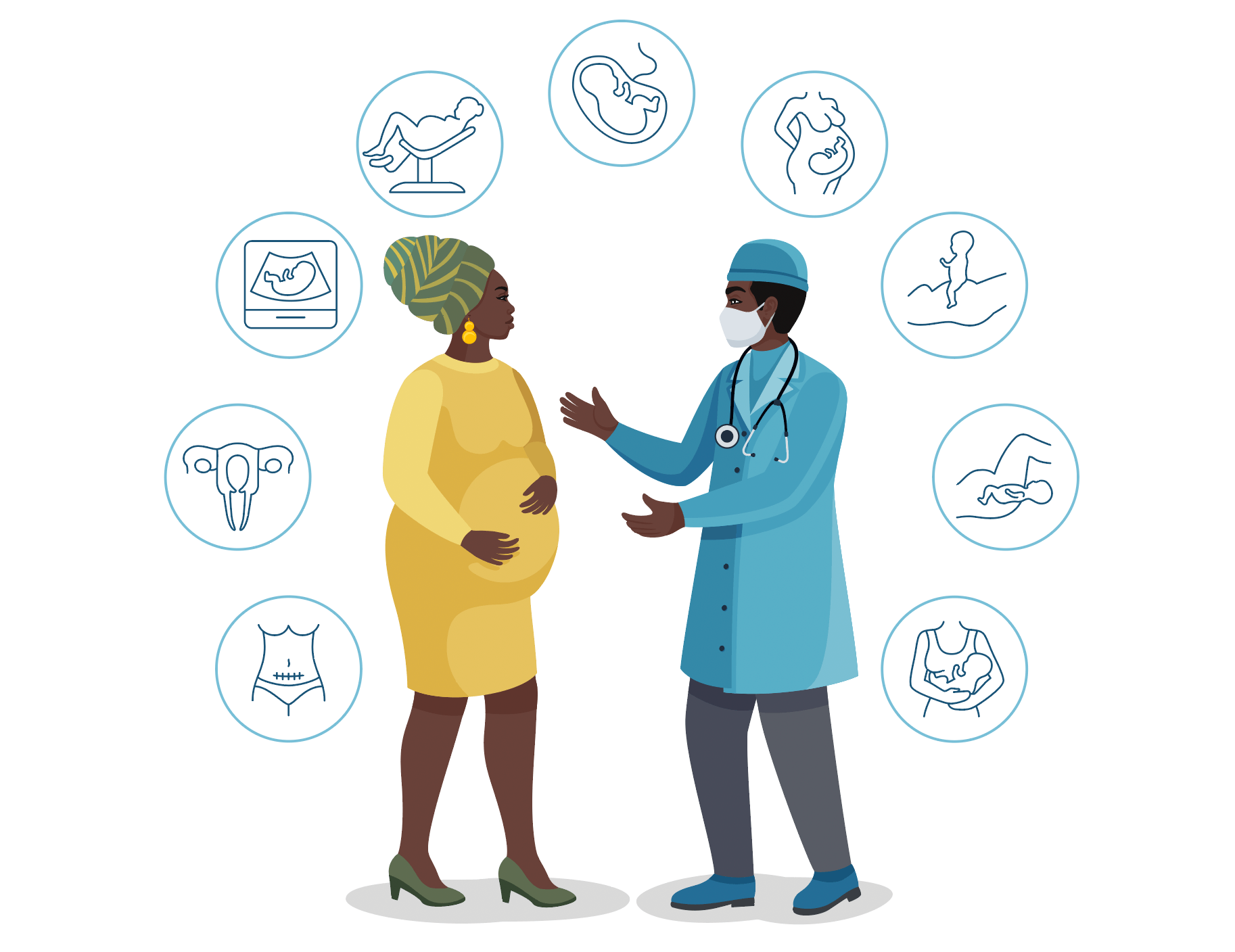The Reema team sat down with Madeline Gardner, a Certified Nurse Midwife at the Minnesota Birth Center, to discuss the state of maternal health and to learn what can be done to improve access to prenatal care.
Why is maternal health important?
When someone is pregnant, they are highly motivated to make changes that they may not make at any other time in their lives. We see this with diet, with higher levels of people quitting smoking and drinking, and they enter drug rehab programs. We see them motivated to leave a domestic violence situation or at least get some additional help. We see people watching their weight in ways they haven’t before, we see people starting to exercise, all for the health of the baby. Really, it’s a super powerful time to impact them for the rest of their lives.
When someone is pregnant, they are highly motivated to make changes that they may not make at any other time in their lives.

What sorts of long-term impacts does this have?
Maternal health is also important because pregnancy is like a canary in a coal mine for hypertension, cardiovascular disease, and diabetes, all of which have a significant impact on the US population. For example, someone at risk for type 2 diabetes is more likely to develop gestational diabetes, so prenatal care is a critical opportunity to educate them and help them understand what’s going on and teach them that they have power over the impacts not just during pregnancy but really over their whole lifetime.
What other outcomes do you see from maternal health?
Because a pregnant person is coming in for regular prenatal appointments, there’s a tremendous opportunity, again, to impact their health for their whole life. If someone doesn’t get this kind of care, the outcomes are much worse—higher rates of preterm birth, much higher rates of maternal mortality, etc. So if someone has, for example, gestational diabetes, then that child is more likely to have type 2 diabetes later in life. If someone breastfeeds from six months up to two years—the WHO standard—then that breastfeeding person has a better lipid profile for the rest of their life, they have reduced rates of breast cancer, and the child has tremendous benefits as well. They have fewer ear infections, less asthma and allergies, less likely to have obesity, and there’s some evidence for a higher IQ. The list goes on and on and on. And all of that is set in motion during the maternal health period.
Ultimately, we want each person to love their experience with material health and healthcare, especially with a first child because it can really impact how that person sets up health care for their entire family.

What barriers do you see that prevent Medicaid members from initiating prenatal care?
The biggest barriers are social determinants of health and how stressful people’s lives are. People work long hours or they don’t have access to childcare or they are stay-at-home parents. This modern life is pretty stressful. People are often able to make it to their appointments, but having the money to buy healthy food, having the time to cook it, or starting to exercise can be really difficult. And it’s hard to do any of that stuff when struggling with mental health, which we’ve seen increase during the pandemic.
Transportation can also be an issue. For that, telehealth has been helpful, but we need to see people. Some health plans have good incentives, but people don’t know about them or figuring out how to access them is too confusing. They’re just not easily accessible.
What sorts of incentives are you thinking about?
Some plans offer prenatal gift cards or gift certificates if you go to enough appointments. Some plans offer postpartum food delivery. People would really benefit from these, but no one knows about them. And as a provider working with at least five different health plans, it’s impossible to track what each plan is doing and which patients are eligible for what. And often people haven’t chosen their health plans yet because they just qualified for being pregnant. Or the data is old or not updated. So there are valuable incentives, but they’re too difficult to navigate, especially when the appointments are really focused on other things.
What role does cultural competency play in maternal health?
We’ve done surveys and focus groups with some of our US Black born patients and we learned a lot. We chose that population because it’s a sizable minority at the Minnesota Birth Center and it’s a population that experiences a lot of racial disparities. One of the most important things we learned was that people really want to see providers who look like them. That builds trust, de-centers whiteness, and promotes culturally congruent care.
People really want to see providers who look like them.

Can you talk a little bit more about trust?
Trust is a real cultural barrier. For minority populations who have experienced racism or micro-aggressions or who see real racial disparities, building trust is essential. Building trust takes time—it takes time to actually get to know somebody, as a real individual, and to really care about them. And it takes time for them to get to know you. That’s hard to do in a 15 minute appointment. So another thing we learned was that people love the Birth Center because we spend so much time with them.
After all, you can know all sorts of things about cultural competency—like what’s common Dakota culture, for example—but that information may not always be relevant to the person sitting in front of you. You have to take the time to actually get to know them.
So what else should providers know?
Providers have to know what their values and biases are, especially white providers, because it’s too common to assume that whiteness and white culture is normal. We do that in all kinds of subtle ways: In how we deal with time and what feels like the right level of eye contact and loudness of voice and how we prioritize who’s the authority in tons of different ways.
While it’s important to learn about other cultures, providers need opportunities to understand whiteness, to see how it’s been made the norm, and to understand how many racial groups have had to contort or adapt to whiteness.
We don’t want that happening in our care. In our care we want the culture and values of the individual to be in the center for this amazing life event where she’s going to be deeply vulnerable. There are all sorts of best practices, but having the time to get to know people is so critical.
So, bottom line, how can we engage people earlier?
As I mentioned, it’s rare to find a pregnant person who isn’t in some way connected to or motivated by the health of their baby. Even for someone who might be making bad choices, there’s still a sense of trying and doing the best I can. So the motivation is there. But too often they don’t connect that motivation with going to prenatal care. Or we don’t take the time to educate and involve them in all the health promoting behaviors. It all takes time and you have to get them in the door.
For example, I saw an individual recently who was really excited about her baby and as soon as she found out she was pregnant, she stopped taking all three of her mental health meds. Cold turkey. Because she didn’t want to harm the baby. So when she came in for her first prenatal appointment three weeks later we had a long talk about the pros and cons of stopping her meds and what the actual risks were. I can’t simply say, “Oh, that was a bad move, you need to go back on your meds.” I need to have a conversation to help her understand. That, of course, took a lot of time.
To improve maternal health, health plans must start reimbursing for time rather than service.
So for us, as midwives at the Birth Center, the bottom line is that getting people to care about maternal health requires creating an experience that they love and want to participate in. We want them to love their care. That, of course, takes time, so to improve maternal health, health plans must start reimbursing for time rather than service. If people feel like they will be listened to and that their care will be tailored to them, then they will feel good about coming in, and more people will do it sooner.
This blog post was written with insights and guidance from Madeline Gardner, APRN, CNM. Thank you Madeline for your contributions to this article! To learn more about the Minnesota Birth Center, visit their website.



